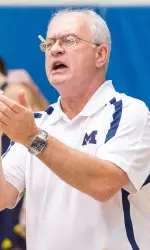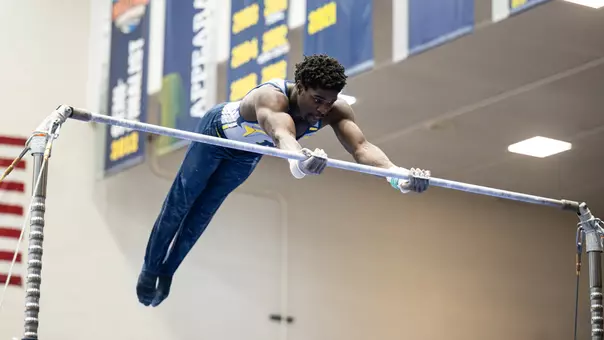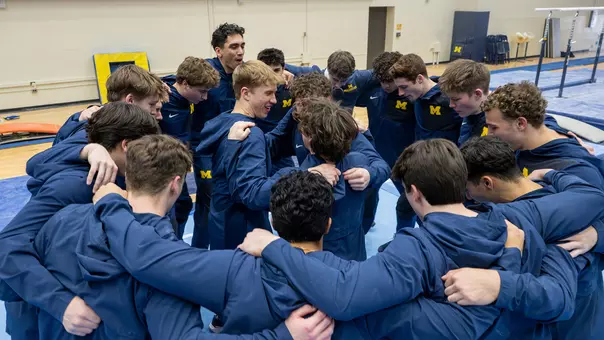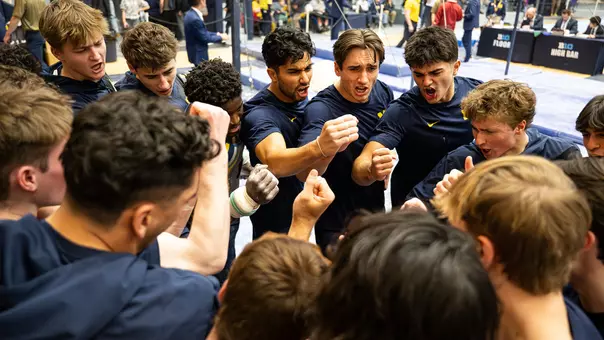
Golder Makes, Keeps Alma Mater a Winner
2/11/2016 12:00:00 AM | Men's Gymnastics
Feb. 11, 2016
By Brad Rudner
Kurt Golder is living proof of how quickly things can change.
It's 1997. Golder, a former Michigan men's gymnast from 1975-77, has been hired from Iowa to resurrect a once-proud program, but it comes at a difficult time. The sport itself is trending downward in the college ranks, as dozens of varsity programs are being cut from coast-to-coast.
It sticks at Michigan, but things aren't real great. In the 10 years prior to Golder's return, the Wolverines finished no higher than fifth at the Big Ten Championships and had eight losing seasons. The year before, U-M went 0-11 and finished last in the Big Ten.
His first two years back weren't much better (U-M went 16-42 in duals), and the third year looked to be going down a similar path, as Golder lost his two best all-around gymnasts before the very first event at the first competition of the season. They didn't get a win until the end of spring break in March.
Facing the prospect of another hopeless, potentially winless season, the team didn't quit, which is telling, because they very easily could have.
"If you were to step into the gym, I don't think you'd have the opinion of, 'Man, these guys are working so hard,'" Golder said. "We were steady. No valleys. Just on the climb the whole time. There was optimism."
"When I came here, the group that I inherited was tired of losing, so they were all ears. Whatever I said, they did. I remember telling them, 'It's all about work ethic.' If you have a strong work ethic, it works out in the end."
As that season went on, some of those injuries began to heal, and Golder could feel the team getting stronger. That group won the Big Ten title -- the program's first since 1975 -- and advanced to the NCAA Championships, which, at the time, was rather unfamiliar territory. Nobody on the roster had ever competed there.
It didn't matter. After finishing first in preliminaries, the pundits naturally said it couldn't handle the pressure and do it again on day two for finals. So all the Wolverines did was prove everyone wrong again, hitting 36-of-36 routines to win the national championship.
Talk about peaking at the right time.
Just take a look at how differently things are today. Golder added three more national championships to his collection (2010, 2013, 2014) -- the third most of any coach in any sport at Michigan behind Matt Mann and Fielding Yost -- and he's got mementos from every one of them in his shrine of an office, including a handwritten note from President Barack Obama on the wall.
A lot of things have to go right to win a national championship. Just ask Red Berenson, Marcia Pankratz, Carol Hutchins or Mike Bottom. And say what you want about a sport that has only 16 varsity teams, but at the end of the day, winning is winning. Having won four, it's not something Golder takes for granted.
"You can have a national championship right in the palm of your hand, and it's so easy for it to slip away," he said. "Once it goes, it's gone forever."


Coach Golder at Michigan

***
At first, Golder didn't want to come back. He was content in Iowa City, serving as top assistant within a rising program with a great recruiting class about to come in. Despite the draw of going back to his alma mater, he didn't think he needed to be a head coach.
Newt Loken wouldn't take 'no' for an answer.
The legendary coach kept pestering Golder with phone calls, pleading for him to interview. To get Loken off his back, Golder agreed. Though his heart might not have been set on it, he decided to prepare for the interview and do it right.
Before Golder got on the plane at the Eastern Iowa Airport in Cedar Rapids, something came over him. Even today, he can't explain what it was but did remember what he thought before takeoff.
"I'm going to get this job, and I'm going to take it."
And he did. After returning to Iowa, Golder got a phone call from Peg Bradley-Doppes, the department's Senior Women's Administrator at the time.
"I have good news," she said. "We want you to take the job."
"Can you give me 24 hours?" Golder asked.
"No, we can't, but I can give you 15 minutes."
Golder walked out of his office and went right to Tom Dunn, Iowa's head coach.
"They gave me 15 minutes. They want me to take the job," Golder said.
"What are you going to do?" Dunn asked.
"I'm going to take it."
"Go call her."
A minute later, Golder phoned Bradley-Doppes to accept. Twenty years later, he's never doubted it for one second. Can't imagine Michigan has, either.
***
Of all the gymnasts Golder has coached -- and there have been a lot -- one stands out.
Golder first heard about Sam Mikulak from one of his alums who was coaching junior gymnastics. The way Golder tells it, Mikulak wasn't looking at Michigan, but one of his teammates, Jordan Gaarenstroom, was.
Golder went out to California to do an in-home visit with Gaarenstroom. Though his focus was on Gaarenstroom, Golder couldn't help but inquire about Mikulak. The invitation was open to tag along with Gaarenstroom on his campus visit. Mikulak agreed.
The rest is history.
"I remember Sam's coach telling me, 'Don't waste your time. He's going to go to Cal,'" Golder said. "His parents were both UC-Berkeley alumni, and he's a California kid. But I didn't let that deter me. I was just going to give it my best shot, and if he said no, we'd move on."
"We went from not being on his radar to sitting No. 1 by the time he left Michigan Stadium."
All Mikulak did was turn into the best collegiate men's gymnast in history. He won seven individual national titles during his four years at Michigan -- tied for the most in NCAA history -- and has blossomed into one of the country's best gymnasts. He's already competed in one Olympics (2012 in London) and appears a shoo-in for the 2016 Games in Rio.
"In my opinion, he's done as much or more for this university than any other athlete," Golder said. "I've had a lot of very talented athletes, but Sam was one that you knew was going to be great. Nobody has accomplished as much as he has."
Could Michigan have won those last two national championships with Sam? Golder sat back in his chair and took a few seconds to ponder that possibility.
"Maybe," he says with a grin.

Coach Kurt Golder with Sam Mikulak
***
Look at this year's roster, and you won't see a Sam Mikulak or Stacey Ervin (though Ervin still remains involved as a program assistant). You'll see a lot of youth -- 17 freshmen or sophomores, to be exact.
With that level of inexperience comes a lot of peaks and valleys. Currently, U-M sits outside the top 10 nationally after a tough start to the season, somewhat reminiscent of Golder's 1999 squad.
"I can't make a prediction for how we'll be this year," Golder said. "Our main goal is to make it to the Super Six, because once you're in it, anything can happen. You can win. If you aren't in it, you can't."
Simple logic, but make no mistake -- this man wants to win another. He's got four national championship rings to choose from on any given day, but he'll only wear the most recent one, at least until he gets another one that's newer, better.
Golder wore his 1999 ring until the team controversially finished second at the 2010 Big Ten Championships. After the meet, he swore he wouldn't wear it again until he got a new one to replace it. Michigan won two weeks later.
"I look forward to the future," he said, "and having a new favorite ring."












